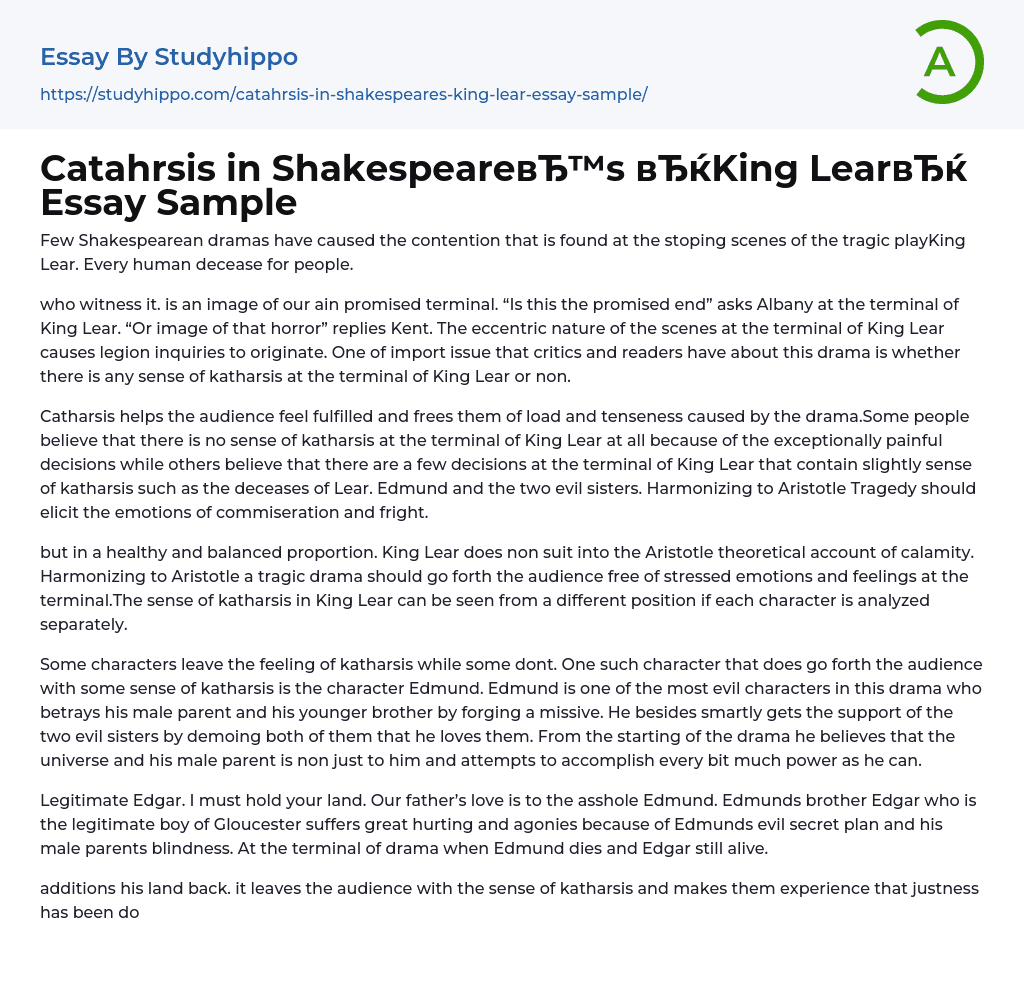Controversy has arisen over the conclusion of King Lear, a tragic play by Shakespeare, because it profoundly affects audiences. The play portrays death as a human experience that is universal.
King Lear's conclusion depicts our inevitable fate, leaving Albany to question whether it is a promised end or a horrifying image. Kent shares this uncertainty, prompting questions surrounding the play's unusual final scenes and the presence of catharsis. This issue is significant for both critics and readers of King Lear.
According to Aristotle, tragedy should evoke pity and fear in the audience. Some argue that there is no sense of catharsis in the end of King Lear due to the painful decisions, while others believe that the deaths of Lear, Edmund, and the two evil sisters provide some sense of catharsis. Overall, catharsis helps the audience
...feel fulfilled and release any tension caused by the drama.
However, King Lear does not conform to Aristotle's definition of tragedy, which requires that a tragic play leave the audience devoid of heightened emotions and sentiments by the end. The concept of catharsis in King Lear can be viewed differently if each character is examined individually, in a healthy and balanced manner.
The audience is left with a sense of katharsis with some characters, whereas others do not evoke such emotions. Edmund is one character who leaves the audience with a sense of katharsis. He betrays his father and younger brother by forging a letter and is considered one of the most evil characters in the play. He also cleverly gains the support of his two evil sisters by demonstrating his love for them. Throughout the play, Edmund believes that he has
been treated unfairly by the world and his father, and strives to attain as much power as possible.
Legitimate Edgar must retain ownership of his land despite their father's preference for the deceitful Edmund. Edgar, who is the true heir of Gloucester, experiences immense pain and anguish as a result of Edmund's evil scheming and their father's inability to see the truth. At the end of the play, although Edmund has died, Edgar continues to survive.
The act of returning his land gives the audience a feeling of catharsis and satisfaction that justice has been served. For some, even the blindness of Gloucester can be seen as a cathartic moment since it takes him a long time to realize that his truest love comes from his own son. Additionally, the deaths of the two wicked sisters Regan and Goneril also evoke a sense of catharsis.
When Lear chose to relinquish his responsibilities and requested that his daughters demonstrate their love for him, two of them deceitfully offered insincere flattery. As a result, his youngest daughter, Cordelia, who gave an honest response, was banished. Once they inherited their father's lands, these two sisters treated him and his followers cruelly, as well as being unfaithful to their husbands by secretly engaging in an affair with Edmund.
The conclusion of King Lear results in a shared demise, evoking a sense of catharsis for the audience who may feel justice has finally prevailed. However, some may argue that the ending lacks catharsis due to the tragic death of Cordelia and other unresolved situations.
In the drama, Cordelia exemplified kindness and fairness. She never caused harm to anyone, even after being expelled from
her father's territory. In contrast to other characters who spoke harshly, Cordelia communicated with gentleness. Additionally, her passing was a notable occurrence in the story.
There is much debate and unease surrounding the demise of King Lear, which leaves many viewers conflicted after initially being pleased with his character. Some believe that his death was deserved, while others view it as unfair. Defenders of Lear's death argue that it provides catharsis, while opponents are left with a sense of anxiety upon leaving the performance.
While some critics argue that King Lear's ending provides catharsis through the joyful portrayal of Lear's death, others believe that there is no catharsis to be found as Lear dies in a state of madness and folly. The deaths of Cordelia and Lear are so distressing for some audience members that they cannot feel anything but sorrow, leading to a lack of catharsis. Throughout the play, there are situations where catharsis can be observed, but ultimately it depends on how each audience member approaches and interprets these events. Last modified at 8:24 on April 07.
Overall, King Lear is a drama that includes elements of catharsis. It is the exceptional tragedy of this play, along with the presence and absence of catharsis, that makes it an outstanding and entertaining work.
- Book Summary essays
- Metaphor essays
- Reader essays
- Rhyme essays
- Literary devices essays
- Villain essays
- Books essays
- Genre essays
- Literary Criticism essays
- Writer essays
- Protagonist essays
- Simile essays
- Poem essays
- Book Report essays
- Book Review essays
- Greek Mythology essays
- Plot essays
- Tragic Hero essays
- Coming of Age essays
- Play essays
- Rhetoric essays
- Rhetorical Question essays
- Translation essays
- Understanding essays
- Reason essays
- Character essays
- Letter essays
- American Literature essays
- Literature Review essays
- Utopia essays
- Poetry Analysis essays
- Dante's Inferno essays
- Between The World and Me essays
- Incidents in The Life of a Slave Girl essays
- Flowers for Algernon essays
- Myth essays
- Everyday Use essays
- Boo Radley essays
- Genesis essays
- Richard iii essays
- Alice in Wonderland essays
- On the road essays
- Ozymandias essays
- The Nightingale essays
- Holden Caulfield essays
- Animal Farm essays
- 1984 essays
- A Hanging essays
- Shooting An Elephant essays
- A Tale Of Two Cities essays




